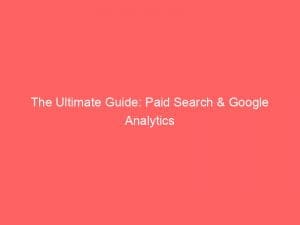- paid search google analytics
- 1. Introduction To The Google Ads Paid & Organic Report
- 2. Requirements For Using The Paid & Organic Report
- 3. Limitations Of The Paid & Organic Report
- 4. Three Main Use Cases Of The Paid & Organic Report
- 5. Understanding The Relationship Between Paid And Organic Search
- 6. Differences Between Paid And Organic Search Results
- 7. Availability And Limitations Of Organic Data
- 8. Tracking And Analyzing Campaigns And Traffic Sources In Google Analytics
In today’s digital age, where search engine algorithms are constantly evolving and competition is fierce, businesses are seeking every advantage they can get to ensure their online presence stands out. Enter paid search and GoogleAnalytics.
These powerful tools offer businesses an invaluable way to analyze and optimize their online advertising and organicsearch strategies. But what if there was a way to uncover the hidden relationship between your paid ads and organic search results?
That’s where the paid & organic report in Google Ads comes in. In just a few clicks, this report provides insights into keyword discovery, optimizing presence, and gaining a holistic view of performance.
Prepare to unlock a world of untapped potential as we dive into the fascinating realm of paid search and Google Analytics.
| Item | Details |
|---|---|
| Topic | The Ultimate Guide: Paid Search & Google Analytics |
| Category | Ads |
| Key takeaway | In today's digital age, where search engine algorithms are constantly evolving and competition is fierce, businesses are seeking every advantage they can get to ensure their online |
| Last updated | December 27, 2025 |
paid search google analytics
The paid search Google Analytics refers to using Google Analytics to track and measure the performance of paid search campaigns. With the paid & organic report in Google Ads, advertisers can gain insights into how their paid ads and organic search results work together.
This report requires a Search Console account linked to the Google Ads account and focuses on the performance of text ads. It offers three main use cases: discovering additional keywords, optimizing presence on high-value queries, and gaining a holistic view of performance.
It is important to note that paid search does not impact organic search ranking, and organic search results are not limited by the targeting settings of Google Ads campaigns. The report provides valuable data on campaigns and traffic sources, including source, medium, campaign, ad content, and keyword dimensions and metrics.
Google Analytics also offers various configuration options and metrics related to paid search campaigns, as well as the ability to exclude certain referring sources or organic search terms from reports. Overall, Google Analytics provides valuable insights for measuring and optimizing paid search campaigns.
Key Points:
- Paid search Google Analytics tracks and measures performance of paid search campaigns.
- The paid & organic report in Google Ads provides insights into the relationship between paid and organic search results.
- The report requires a Search Console account linked to the Google Ads account and focuses on text ad performance.
- The use cases for the report include discovering keywords, optimizing presence on high-value queries, and gaining a holistic view of performance.
- Paid search does not impact organic search ranking and organic search results are not limited by targeting settings in Google Ads.
- Google Analytics provides valuable data on campaigns and traffic sources, including dimensions and metrics such as source, medium, campaign, ad content, and keyword.
Sources
https://support.google.com/google-ads/answer/3097241?hl=en
https://support.google.com/analytics/answer/6205762?hl=en
https://www.getelevar.com/analytics/5-awesome-paid-search-reports-in-google-analytics/
https://support.google.com/analytics/answer/6050679?hl=en
Check this out:
💡 Pro Tips:
1. Use the paid & organic report to compare the performance of text ads and organic search results, and identify opportunities for improvement.
2. Regularly review and analyze the paid & organic report to uncover new keywords that can be targeted in your paid search campaigns.
3. Optimize your presence on high-value queries by analyzing the organic search results in the paid & organic report and adjusting your paid search strategy accordingly.
4. Don’t rely solely on paid search to improve your organic search ranking – optimize your website and content for organic search separately.
5. Take advantage of the holistic view of performance offered by the paid & organic report to get a comprehensive understanding of how your paid and organic efforts are contributing to overall success.
1. Introduction To The Google Ads Paid & Organic Report
The Google Ads Paid & Organic Report is a powerful tool within Google Analytics that provides valuable insights into how paid ads and organic search results work together. This report allows advertisers to gain a holistic view of their online presence and understand how their paid campaigns and organic search efforts complement each other.
2. Requirements For Using The Paid & Organic Report
To access and utilize the Paid & Organic Report, you must have a Search Console account that is linked to your Google Ads account. This link is essential for the data synchronization between the two platforms.
It is important to note that the report analyzes the performance of text ads only and does not include data for Shopping ads or click-to-download ads.
3. Limitations Of The Paid & Organic Report
While the Paid & Organic Report offers valuable insights, it is important to understand its limitations. One major limitation is that paid search does not directly impact organic search ranking.
This means that investing in paid ads does not guarantee a boost in organic search visibility. Additionally, the report does not consider the targeting settings of Google Ads campaigns when analyzing organic search results.
4. Three Main Use Cases Of The Paid & Organic Report
The Paid & Organic Report serves three primary use cases. Firstly, it helps advertisers discover additional keywords that they may not have considered targeting in their paid campaigns.
By analyzing the keywords driving organic traffic, advertisers can identify new opportunities to expand their paid keyword strategy.
Secondly, the report assists in optimizing the presence on high-value queries. By identifying the queries with a significant organic presence but limited paid visibility, advertisers can focus their efforts on improving their paid campaigns’ performance for these queries.
Lastly, the Paid & Organic Report provides a holistic view of performance by combining data from paid and organic sources. This comprehensive perspective allows advertisers to evaluate the overall impact of their marketing efforts and make informed decisions regarding resource allocation and campaign optimization.
5. Understanding The Relationship Between Paid And Organic Search
It is essential to understand that paid search and organic search results are separate entities. Paid ads appear at the top and bottom sections of the search engine results page (SERP), marked as “Ad,” while organic search results are the naturally generated listings.
Paid search campaigns do not directly influence organic search rankings. Google’s algorithms determine organic rankings based on various factors, including relevancy and authority.
While paid campaigns can increase visibility and traffic, they have no direct impact on organic search rankings.
6. Differences Between Paid And Organic Search Results
While both paid and organic search results are essential for an effective online presence, there are notable differences between the two. Organic search results are not limited by the targeting settings of Google Ads campaigns.
This means that organic search can potentially reach a broader audience and provide exposure beyond the parameters defined in paid campaigns.
Furthermore, it is possible to have more organic impressions than paid impressions. This occurs when a website receives significant visibility through organic search results without investing in paid ads.
The Paid & Organic Report helps advertisers understand these dynamics by providing insights into the impressions generated by both channels.
7. Availability And Limitations Of Organic Data
The availability of historical organic data in the Paid & Organic Report is limited to the date you establish a link between your Search Console account and Google Ads account. It is crucial to set up this link as early as possible to capture long-term data for analysis.
Without the link, historical organic data will not be accessible in the report.
Additionally, organic traffic data cannot be filtered to specific linked domains in the report. The report provides an overview of organic search performance for your entire website but does not allow you to isolate performance for specific domains.
8. Tracking And Analyzing Campaigns And Traffic Sources In Google Analytics
Google Analytics plays a significant role in tracking and analyzing campaigns and traffic sources. The platform collects, processes, and reports campaign and traffic source data, enabling marketers to gain deep insights into their website’s performance.
Each session in Google Analytics is attributed to a single campaign or traffic source. Source precedence and campaign precedence determine which campaign or traffic source information is used to attribute sessions.
Different campaigns, whether organic or paid, initiate new sessions.
Google Analytics offers the flexibility to configure custom campaign parameters and custom campaign sources, allowing advertisers to track and process sessions as custom campaigns. Paid search referrals are processed based on custom campaign parameters or Google Ads/Google Marketing Platform click IDs, while organic search-engine referrals are processed by comparing the hostname and query parameter of the document referrer field.
In addition to campaign and traffic source dimensions, Google Analytics provides various metrics and configuration options for paid search campaigns. These include organic searches, referral source path, and social network referrals.
Advertisers can also automatically populate or manually import additional fields for paid campaigns in Google Ads or Google Marketing Platform.
Advanced configuration options at the property level, such as campaign timeout periods and custom organic search sources, offer further customization possibilities. It is also possible to set exclusions at the property level to exclude specific referring sources or organic search terms from reports.
In conclusion, the Paid & Organic Report in Google Analytics provides advertisers with valuable insights to measure and optimize their paid search campaigns effectively. By understanding the relationship between paid and organic search, utilizing the report’s functionalities, and leveraging Google Analytics’ tracking and analysis capabilities, marketers can make data-driven decisions to enhance their overall campaign performance.
Updated for the new year’s advertising best practices.
Native Ad Network • Programmatic Advertising • Performance Marketing Tips • Buy Traffic











